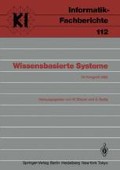Zusammenfassung
Der Informationstechnologie kommt in raplde zunehmendem Mape immer mehr eine SchlUsselrolle in den Industriestaaten zu. Auf dem industriellen Produktionssektor ist diese Entwicklung zum Teil bereits weit fortgeschritten, im Dienstleistungssektor kommt sie gerade auf hBhere Touren, doch etwa auch im Agrarsektor wird sie nicht mehr allzu lange auf sich warten lassen.
Access this chapter
Tax calculation will be finalised at checkout
Purchases are for personal use only
Preview
Unable to display preview. Download preview PDF.
References
A study of the competitive position of the US Computer Industry. US Department of Commerce, March 10, 1983
Software technology for adaptable, reliable systems (STARS) program stategy. US department of defense, 15 March 1983.
B. W. Bochum, Software Engineering Economics, Prentice Hall 1981
W. Teitelbaum, L. Masinter, The INTERLISP programming environment, Computer April 1981
W.Teitelbaum, T. Reps, S. Horwitz, The why and wherefore of the Cornell Program Synthesizer, ACM SIGPLAN Notices, Bd. 16, Nr. 6, S. 8–16, Juni 1981
A series on Smalltalk, BYTE, Bd. 6, Nr. 8, August 1981
H.Htinke (Hrsg.), Software Engineering Environments, Proceedings, North Holland, Amsterdam, 1981
A. I. Wassermann, Tutorial: Software development environ-ments, IEEE Cat.No.EHO 187–5
W. Hesse, Methoden und Werkzeuge zur Softwareentwicklung, Informatik Spektrum 4, 229–245, 1981
J. N.Baxton, L. E. Druffel, Requirements for an ADA Programming Support Environment, siehe Hünke7
Silverberg, B.A., An overview of the hierarchical development methodology, siehe Hünke7
M. A. Jackson, Constructive methods of program design, LNCS 44, 1976
S/E/TEC — Die Software Engineering Technologie von Soft-lab, Softlab, München, 1981
A. Biermann et al. (Hrsg.), Automatic program construction methods, MacMillan, New York, 1984
W. Bibel u. K. M. Hörnig, LOPS-A system based on a stragical approach to programm sythesis, in A.Biermann14, Kap. 3, 1984
T. Moto-oka, Proceedings Intern. Conference on Fifth Generation Computer Systems, North Holland, 1982
Point paper — DARPA Strategic Computing Program, Washington, 7. Nov. 1983
W. Bibel, Prädikatives Programmieren, LNCS 33, Springer, Berlin, 274–283, 1975
E. Hehner, Predicative Programming, CACM 27, 134–151, 1984
W. Bibel, Logical program sythesis, in: T. Moto-oka16
W. Bibel, Automated theorem proving, Vieweg Verlag, Wies-baden, 1982
L. Zadeh, Coping with the imprecision of the real world, CACM 27, 304–311, 1984
W. Bibel an K. M. Hörnig, LOPS — A System baced on a strategical approach to program sythesis, chapter 3 in Biermann14
S. J. Greenspan, Requirements modeling: A knowledge representation approach to Software requirements definition, TR CSRG-155, U. Toronto 1984
B. Sheil, Power tools for programmers, Datamation, 131–144, 1983
P.Degano and E.Sandewall (Eds.), Integrated Interactive Computing Systems, North-Holland, 1983
R. S. Boyer and J S. Moore, A computational logic, Academic Press, New York, 1979
W.Polak, Program Verification at Stanford: Past, Present, Future, In: GWAI-81, Informatik-FB 47, Springer, Berlin, 1981
Green and T. T. Pressburger, CHI, Kestrel Institute, Palo Alto, CA
K. M. Hörnig, Can logical program synthesis cope with real life problems? Bericht ATP-11-XI1-81, FGKI Inst. f. Informatik, TUM, 1981
W. G. Wilson and C. C. John, Semantic Code Analysis, IJCAI-83, 520–525, Kaufmann, Los Altos, 1983
Author information
Authors and Affiliations
Editor information
Editors and Affiliations
Rights and permissions
Copyright information
© 1985 Springer-Verlag Berlin Heidelberg
About this paper
Cite this paper
Bibel, W. (1985). Wissensbasierte Software-Entwicklung. In: Brauer, W., Radig, B. (eds) Wissensbasierte Systeme. Informatik-Fachberichte, vol 112. Springer, Berlin, Heidelberg. https://doi.org/10.1007/978-3-642-70840-4_2
Download citation
DOI: https://doi.org/10.1007/978-3-642-70840-4_2
Publisher Name: Springer, Berlin, Heidelberg
Print ISBN: 978-3-540-15999-5
Online ISBN: 978-3-642-70840-4
eBook Packages: Springer Book Archive

